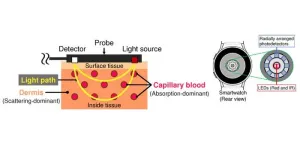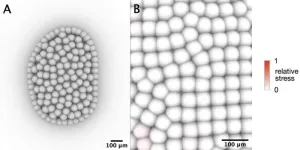(Press-News.org) Barcelona, Spain (October 29, 2024) - In a compelling new Genomic Press Interview published in Brain Medicine, Dr. Raül Andero Galí reveals how his early passion for classical piano shaped his unique approach to neuroscience research. As an ICREA Research Professor at the Autonomous University of Barcelona, Dr. Andero Galí leads groundbreaking studies that connect mouse and human fear responses, potentially revolutionizing treatments for PTSD and anxiety disorders.
The intersection of stress and memory has captured Dr. Andero Galí's attention throughout his career. "All animals face threats throughout their lives, triggering adequate stress responses vital for survival," he explains in the interview. "Memories shape our reality, and the fact that these are not fixed truths, but malleable constructs influenced by emotions fascinates me."
His laboratory uniquely combines cutting-edge techniques, including in vivo calcium imaging in mice and human fear response studies. Current research focuses on understanding how the menstrual cycle influences fear memory formation, using sophisticated methods to measure sex hormones and fear responses in both species.
What makes Dr. Andero Galí's approach particularly noteworthy is his commitment to breaking down traditional research barriers. "We need to transform how neuroscience research is conducted by breaking down the traditional barriers between animal and human studies," he asserts. "By advocating for more integrated cross-species approaches, we can create a more comprehensive and translatable understanding of the human brain."
The laboratory's focus on neuropeptide receptors presents an intriguing avenue for drug development. Unlike current medications that target receptors throughout the entire brain, these receptors are predominantly expressed in emotional regions, potentially offering more precise treatment options for fear-based disorders.
Dr. Andero Galí's journey from musician to neuroscientist offers unique insights into the creative thinking necessary for scientific innovation. His laboratory environment reflects this philosophy, emphasizing intellectual growth and collaborative learning. "The most important thing for me in my laboratory is that it has a healthy and positive environment in which the different members interact and learn from each other," he shares.
Recent publications, including a 2024 Science Advances paper, demonstrate the success of this integrated approach, showing concordant data between mouse neuronal activity and human neuroimaging during fear responses. These findings raise important questions about sex differences in fear processing and the potential for more targeted therapeutic approaches.
Dr. Andero Galí's Genomic Press interview is part of a larger series that highlights the people behind today’s most influential scientific ideas. Each interview in the series offers a blend of cutting-edge research and personal reflections, providing readers with a comprehensive view of the scientists shaping the future. By combining a focus on professional achievements with personal insights, this interview style invites a richer narrative that both engages and educates readers. This format provides an ideal starting point for profiles that delve into the scientist’s impact on the field, while also touching on broader human themes. More information on the research leaders and research rising stars featured by Genomic Press can be found in our website: https://genomicpress.com.
The full Genomic Press Interview, titled “Raül Andero Galí: Bridging animal and human studies to understand stress and memory” is available on 29 October 2024 in Brain Medicine, providing detailed insights into Dr. Andero Galí's research methodology and vision for the future of neuroscience. The interview is freely available online at https://url.genomicpress.com/2p8sshr4
About Brain Medicine: Brain Medicine (ISSN: 2997-2639) is a peer-reviewed journal published by Genomic Press, New York. Brain Medicine is a new home for the cross-disciplinary pathway from innovation in fundamental neuroscience to translational initiatives in brain medicine. The journal’s scope includes the underlying science, causes, outcomes, treatments, and societal impact of brain disorders, across all clinical disciplines and their interface.
END
From concert piano to fear memory research: Dr. Raül Andero Galí bridges mouse-human studies
Latest Genomic Press Interview reveals how a former musician became a leading neuroscientist studying stress responses across species
2024-10-29
ELSE PRESS RELEASES FROM THIS DATE:
Arctic whales research collaboration is signed by Heriot-Watt University and HX Expeditions (Hurtigruten Expeditions)
2024-10-29
Pioneering research to protect and conserve Arctic whale populations is to begin under a new five-year collaboration between Heriot-Watt University in Edinburgh, Scotland and HX Expeditions (Hurtigruten Expeditions), a world leader in travel exploration.
The partners have signed a five-year Memorandum of Understanding (MoU), beginning in 2024, to research challenges facing marine life in the high Arctic – the most northern part of the Arctic region and one of the world’s most fragile ecosystems.
The agreement will see Heriot-Watt University and HX work together on the Whales & Arctic Vessels Project (WAVE), ...
Scientists develop tool to predict sepsis in apparently healthy newborns
2024-10-29
A genetic signature in newborns can predict neonatal sepsis before symptoms even start to show, according to a new study.
The study, led by UBC and SFU researchers in collaboration with the Medical Research Council (MRC) Unit The Gambia, has the potential to help healthcare workers diagnose babies earlier, including in lower- and middle-income countries (LMICs) where neonatal sepsis is of particular concern. The research, published today in eBiomedicine, is funded by the National Institutes of Health and the Canadian Institutes of Health Research.
“Neonatal sepsis is caused by the body’s irregular response ...
AI algorithm accurately detects heart disease in dogs
2024-10-29
Researchers have developed a machine learning algorithm to accurately detect heart murmurs in dogs, one of the main indicators of cardiac disease, which affects a large proportion of some smaller breeds such as King Charles Spaniels.
The research team, led by the University of Cambridge, adapted an algorithm originally designed for humans and found it could automatically detect and grade heart murmurs in dogs, based on audio recordings from digital stethoscopes. In tests, the algorithm detected heart murmurs with a sensitivity ...
What animal societies can teach us about ageing
2024-10-29
Red deer may become less sociable as they grow old to reduce the risk of picking up diseases, while older house sparrows seem to have fewer social interactions as their peers die off, according to new research which shows humans are not the only animals to change our social behaviour as we age.
A collection of 16 studies, including six from the University of Leeds, have been published today as part of a special issue of the Philosophical Transactions of the Royal Society, investigating ageing and society across the natural world.
One study into red deer shows that ...
Enhancing the accuracy of wearables that measure blood glucose levels
2024-10-28
Diabetes is an increasingly pervasive disease, currently affecting over 500 million adults worldwide. Since there is as yet no cure for type 1 or type 2 diabetes, patients must regularly monitor their BGLs to keep them in check. Though BGL-measuring devices relying on painful finger pricks have been the gold standard for decades, modern technology is slowly opening doors to better alternatives.
Many researchers have proposed noninvasive methods to monitor BGLs using widely available wearable devices, such as smartwatches. For example, by placing the LEDs ...
Increasing social supports for new mothers with opioid use disorder
2024-10-28
Opioid use disorder (OUD) is a growing public health problem among pregnant and parenting people in the U.S. Between 1999 and 2014, the number of pregnant women with OUD increased by more than four times. This trend also coincides with a rise in pregnancy-associated maternal overdose mortality.
Researchers at Thomas Jefferson University, led by Meghan Gannon, PhD, MSPH, investigated how community-based supports, like doulas, can be integrated into health care for mothers who use opioids. Using a social network analysis, ...
Mitigating the neurotoxic effects of lead exposure
2024-10-28
Lead exposure is a risk to any human, but children are most vulnerable to the element’s neurotoxicity, which can lead to developmental delays, learning difficulties and mood changes among other symptoms. There has been some progress in reducing exposure and preventing neurotoxicity, but hundreds of thousands of American children are still affected.
A new study by Thomas Jefferson University neuroscientist Jay Schneider, PhD, suggests that the toxic effects of lead can be mitigated by attentive maternal care and an enriched environment ...
Developing kidneys from scratch
2024-10-28
To Alex Hughes, Assistant Professor in Bioengineering within Penn Engineering and in Cell and Developmental Biology within Penn Medicine, the kidney is a work of art. “I find the development of the kidney to be a really beautiful process,” says Hughes.
Most people only ever see the organ in cross-section, through textbooks or by dissecting animal kidneys in high school biology class: a bean-shaped slice with lots of tiny tubes. “I think that really undersells how amazing the structure is,” says ...
Airbnbs associated with more crime in London, new study shows
2024-10-28
Since its founding in 2008, the short-term homestay platform Airbnb has expanded to 100,000 cities in more than 220 countries, and, according to data from the company, 1.5 billion guests had stayed in Airbnb-listed properties through 2023.
Much of the academic research on Airbnb activity comes from economics and business literature and focuses on housing-supply impacts, says David Kirk, professor of criminology at the University of Pennsylvania. Yet research on neighborhood impacts is limited, and that research neglects the impacts of Airbnb activity on measures of community cohesion and safety.
Kirk teamed with University of Cambridge criminologist ...
New study finds invasive plants drive homogenization of soil microbial communities across U.S.
2024-10-28
Invasive plants are doing more than just taking over landscapes — they’re also changing the soil beneath them. A new study co-authored by Matthew McCary, assistant professor of biosciences at Rice University, reveals that these species are reshaping soil microbial communities across the U.S., making them more uniform and altering how ecosystems function. The findings, published in Proceedings of the National Academy of Sciences on Oct. 24, shed light on the far-reaching impacts of invasive plants, which extend beyond what we see above ground.
The ...
LAST 30 PRESS RELEASES:
Scientists show how to predict world’s deadly scorpion hotspots
ASU researchers to lead AAAS panel on water insecurity in the United States
ASU professor Anne Stone to present at AAAS Conference in Phoenix on ancient origins of modern disease
Proposals for exploring viruses and skin as the next experimental quantum frontiers share US$30,000 science award
ASU researchers showcase scalable tech solutions for older adults living alone with cognitive decline at AAAS 2026
Scientists identify smooth regional trends in fruit fly survival strategies
Antipathy toward snakes? Your parents likely talked you into that at an early age
Sylvester Cancer Tip Sheet for Feb. 2026
Online exposure to medical misinformation concentrated among older adults
Telehealth improves access to genetic services for adult survivors of childhood cancers
Outdated mortality benchmarks risk missing early signs of famine and delay recognizing mass starvation
Newly discovered bacterium converts carbon dioxide into chemicals using electricity
Flipping and reversing mini-proteins could improve disease treatment
Scientists reveal major hidden source of atmospheric nitrogen pollution in fragile lake basin
Biochar emerges as a powerful tool for soil carbon neutrality and climate mitigation
Tiny cell messengers show big promise for safer protein and gene delivery
AMS releases statement regarding the decision to rescind EPA’s 2009 Endangerment Finding
Parents’ alcohol and drug use influences their children’s consumption, research shows
Modular assembly of chiral nitrogen-bridged rings achieved by palladium-catalyzed diastereoselective and enantioselective cascade cyclization reactions
Promoting civic engagement
AMS Science Preview: Hurricane slowdown, school snow days
Deforestation in the Amazon raises the surface temperature by 3 °C during the dry season
Model more accurately maps the impact of frost on corn crops
How did humans develop sharp vision? Lab-grown retinas show likely answer
Sour grapes? Taste, experience of sour foods depends on individual consumer
At AAAS, professor Krystal Tsosie argues the future of science must be Indigenous-led
From the lab to the living room: Decoding Parkinson’s patients movements in the real world
Research advances in porous materials, as highlighted in the 2025 Nobel Prize in Chemistry
Sally C. Morton, executive vice president of ASU Knowledge Enterprise, presents a bold and practical framework for moving research from discovery to real-world impact
Biochemical parameters in patients with diabetic nephropathy versus individuals with diabetes alone, non-diabetic nephropathy, and healthy controls
[Press-News.org] From concert piano to fear memory research: Dr. Raül Andero Galí bridges mouse-human studiesLatest Genomic Press Interview reveals how a former musician became a leading neuroscientist studying stress responses across species






